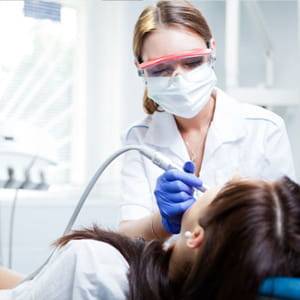What do dentists do?
Dentists diagnose and treat a variety of dental conditions from cracked teeth to gum disease. They may also educate patients and help prevent oral health problems. Dentists also screen for conditions, such as oral cancer. Some dentists choose to focus on a specific area of dentistry such as orthodontics or periodontics while others provide general dentistry and primary care.
Why become a dental specialist?
First, let’s define what it means to be a dental specialist. According to the American Dental Association (ADA) “A specialty is an area of dentistry that has been formally recognized by the American Dental Association as meeting the specified Requirements for Recognition of Dental Specialties”. The responsibilities of the different areas of specialization, the requirements, and other information can be found here in Dental Specialties. Currently, there are 5 Dental Specialties recognized by the ADA.
Not all areas in dentistry will satisfy the requirements for specialty recognition. However, the public and profession benefit substantially when non-specialty groups develop and advance areas of interest through education, practice, and research. Acknowledged by the profession, the contributions of such and their endeavors are encouraged.
Here are the specialties recognized by the top dental organization:
Dental Public Health
Dental public health is the science and art of preventing and controlling dental diseases and promoting dental health through organized community efforts. It is that form of dental practice which serves the community as a patient rather than the individual. It is concerned with the dental health education of the public, with applied dental research, and with the administration of group dental care programs as well as the prevention and control of dental diseases on a community basis.
Endodontics
Endodontics is the branch of dentistry which is concerned with the morphology, physiology, and pathology of the human dental pulp and periradicular tissues. Its study and practice encompass the basic and clinical sciences including biology of the normal pulp, the etiology, diagnosis, prevention and treatment of diseases and injuries of the pulp and associated periradicular conditions.
Orthodontics and Dentofacial Orthopedics
Orthodontics and dentofacial orthopedics is the dental specialty that includes the diagnosis, prevention, interception, and correction of malocclusion, as well as neuromuscular and skeletal abnormalities of the developing or mature orofacial structures.
Pediatric Dentistry
Pediatric Dentistry is an age-defined specialty that provides both primary and comprehensive preventive and therapeutic oral health care for infants and children through adolescence, including those with special health care needs.
Periodontics
Periodontics is that specialty of dentistry which encompasses the prevention, diagnosis, and treatment of diseases of the supporting and surrounding tissues of the teeth or their substitutes and the maintenance of the health, function, and esthetics of these structures and tissues.
Prosthodontics
Prosthodontics is the dental specialty pertaining to the diagnosis, treatment planning, rehabilitation and maintenance of the oral function, comfort, appearance and health of patients with clinical conditions associated with missing or deficient teeth and/or oral and maxillofacial tissues using biocompatible substitutes.
How Your Dentist Can Help?
Whenever you visit your dentist, during your regular checkup, they will also perform a brief oral cancer screening, in which they will look for:
- Persistent oral sores in the mouth that haven’t healed for weeks
- A noticeably red or white patch of tissue that can be smooth or rough
- A lump or growth on the neck or face
- Oral pain that seems to have no dental cause
- They will also ask if you constantly have a sore throat or hoarse voice, both of which point towards oral cancer as well.
Should your dentist discover something that causes concern, they can arrange for you to have a biopsy to get a proper diagnosis. When detected early, oral cancer has about an 85% survival rate, but that number drops to about 20% after just a few years. This is why dentists recommend that every adult should have at least one oral cancer screening per year, which is conveniently included as part of every routine checkup.
What to Remember
Oral cancer claims live every single day, but just by seeing your dentist twice a year, you can help keep yourself protected. And, if you notice any of the signs mentioned above between appointments, be sure to go ahead and contact your dentist so they can help you get the attention you need right away. With your diligence and their help, you can make sure that you have a healthy smile you’ll be able to show off for many years to come.

